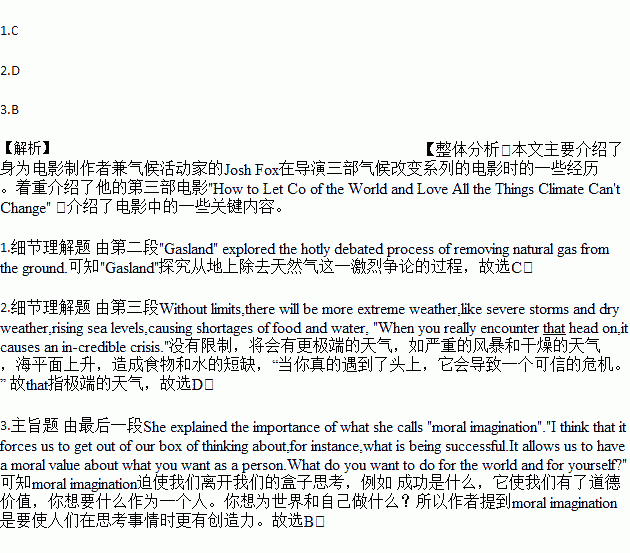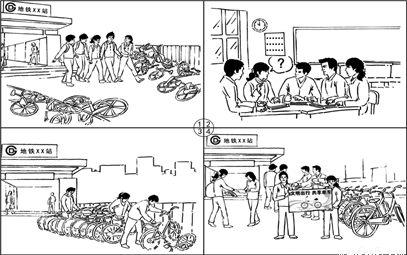题目内容
"How to Let Co of the World and Love All the Things Climate Can't Change" is the latest movie from film-maker and climate activist Josh Fox.The movie is the third film in a three-part series about climate change.
In 2010,Fox's documentary "Gasland" was appointed for the highest award-an Oscar. "Gasland" explored the hotly debated process of removing natural gas from the ground.He examined the subject again in "Gasland Ⅱ".
Fox was in Washington,D.C.recently to present his third film.He was arrested during a protest against a new fuel pipeline.In the film,Fox says pollution from fossil fuels must be reduced.Without limits,there will be more extreme weather,like severe storms and dry weather,rising sea levels,causing shortages of food and water, "When you really encounter that head on,it causes an in-credible crisis."
In the new film,Fox travels through a sunless forest in the Amazon with local activists to measure oil spills.He goes to a village in Ecuador to learn how people there stopped a pipeline from being built.He joins young people in Australia to stop boats from entering the port of Newcastle.
"You should probably know the downside of what we're about to do.This is the short list: drowning,being arrested: being run over by boats,drifting away in currents out into the Pacific Ocean,cultural disrespect,big waves."
Also in the film,Fox talks to Ella Zhou,an energy expert.She explained the importance of what she calls "moral imagination"."I think that it forces us to get out of our box of thinking about,for instance,what is being successful.It allows us to have a moral value about what you want as a person.What do you want to do for the world and for yourself?"
1.Why was Fox's "Gasland" appointed for an Oscar?
A. Because Fox is the most famous film-maker in America.
B. Because Fox had experienced incredible crisis in the globe.
C. Because the movie is mainly about global climate change.
D. Because Fox was arrested for opposing a new fuel pipeline.
2.What does the underlined word "that" refer to?
A. The pollution from fossil fuels. B. The economic crisis.
C. The increasing population. D. The extreme weather.
3.What's the purpose of "moral imagination" mentioned in the last paragraph?
A. To warn people of the importance of creating new fuels.
B. To make people learn to be creative in thinking things.
C. To motivate people to achieve their dreams in their life.
D. To stimulate people to find the values of individuals.


 ub are urging everyone to feed a “silent guest” at this year's Thanksgiving. These students have been holding fund?raisers for the World Food Programme (WFP) and trying to get people to join their “silent guest” plan.
ub are urging everyone to feed a “silent guest” at this year's Thanksgiving. These students have been holding fund?raisers for the World Food Programme (WFP) and trying to get people to join their “silent guest” plan.